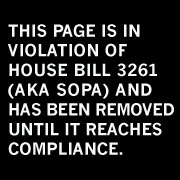
A murder of Congresscritters and Senators have told Internet ad-brokers
that they expect them to behave as though SOPA passed into law (instead
of suffering hideous, total defeat); they want the companies to
establish a secret, unaccountable blacklist of "pirate" sites. The group
comprises Congressmen Bob Goodlatte and Adam Schiff, and Senators
Sheldon Whitehouse and Orrin Hatch. This isn't just a terrible idea,
it's also an obviously illegal antitrust violation, as Mitch Stoltz from
the Electronic Frontier Foundation
points out:
Letting commercial companies with their own competitive motivations
decide which sites are "rogue" or "pirate" sites is a recipe for abuse.
It means that site owners who comply with copyright law could still have
their sources of revenue cut off when a company who might be a
competitor asks for it. The legislators' letter doesn't define "online
piracy sites," but most of the definitions we've seen lately focus on
the number of takedown requests a site has received from copyright
holders, or the number of requests sent to search engines about the
site. Since just a few companies send out a large portion of the
takedown requests, those companies would effectively have the power to
control who gets deemed a "piracy site."
As a federal law, this scheme would have created serious First Amendment
and due process problems. As a private agreement among competing ad
networks, it could raise other legal problems. Under the Sherman
Antitrust Act, companies that compete with each other aren't allowed to
make a pact amongst themselves about who they will refuse to do business
with, especially if the purpose of the pact is to squelch competition
or punish a rival. It's called a "group boycott" or "concerted refusal
to deal," and it can lead to big-money lawsuits and years of trouble. In
some cases, groups of competitors sharing a list of companies that they
deem to be bad actors, with a wink-wink understanding that no one in
the group should do business with those companies, was deemed a
violation of the Sherman Act1.
Claiming that an industry-wide refusal to deal is justified by "fighting
piracy" doesn't necessarily avoid an antitrust jam. In 2003, the Motion
Picture Association of America decided that its members, major movie
studios who compete with one another, would no longer send pre-release
"screener" copies of films to members of awards committees like the
Motion Picture Academy. According to the MPAA, the group boycott of
awards committees was needed to stop infringement of pre-release movies.
But the group ban put smaller studios at a huge disadvantage in getting
award nominations and votes. In just two months, a court decided that
the MPAA's screener ban was likely illegal, and that loss may have
precipitated MPAA head Jack Valenti's retirement a few months later.
 A murder of Congresscritters and Senators have told Internet ad-brokers
that they expect them to behave as though SOPA passed into law (instead
of suffering hideous, total defeat); they want the companies to
establish a secret, unaccountable blacklist of "pirate" sites. The group
comprises Congressmen Bob Goodlatte and Adam Schiff, and Senators
Sheldon Whitehouse and Orrin Hatch. This isn't just a terrible idea,
it's also an obviously illegal antitrust violation, as Mitch Stoltz from
the Electronic Frontier Foundation points out:
A murder of Congresscritters and Senators have told Internet ad-brokers
that they expect them to behave as though SOPA passed into law (instead
of suffering hideous, total defeat); they want the companies to
establish a secret, unaccountable blacklist of "pirate" sites. The group
comprises Congressmen Bob Goodlatte and Adam Schiff, and Senators
Sheldon Whitehouse and Orrin Hatch. This isn't just a terrible idea,
it's also an obviously illegal antitrust violation, as Mitch Stoltz from
the Electronic Frontier Foundation points out:

No comments:
Post a Comment